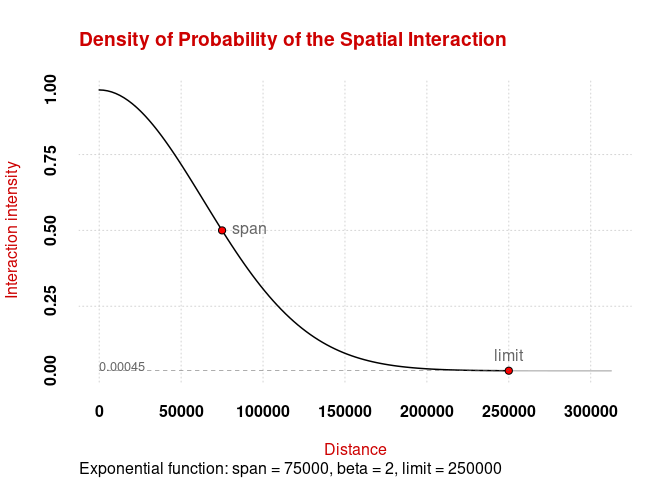

This package provides functions to compute the potential model as defined by Stewart (1941). Several options are available to customize the model, for example it is possible to fine-tune the distance friction functions or to use custom distance matrices. Some computations are parallelized to improve their efficiency.
You can install the released version of potential from
CRAN
with:
install.packages("potential")You can install the development version of potential
from GitHub with:
# install.packages("remotes")
remotes::install_github("riatelab/potential")library(mapsf)
library(potential)
# Display the spatial interaction function
plot_inter(fun = "e", span = 75000, beta = 2, limit = 250000)
# create a regular grid
y <- create_grid(x = n3_poly, res = 20000)
# compute potentials
pot <- mcpotential(
x = n3_pt, y = y,
var = "POP19",
fun = "e", span = 75000,
beta = 2, limit = 250000,
ncl = 2
)
# Define potential according to the maximum value
y$pot <- pot / max(pot) * 100
# create equipotential areas
bks <- seq(0, 100, length.out = 11)
equipot <- equipotential(y, var = "pot", breaks = bks, mask = n3_poly)
# map potentials
mf_theme("default")
mf_map(x = equipot, var = "min", type = "choro",
breaks = bks,
pal = hcl.colors(10, 'Teal'),
border = "#121725",
leg_val_rnd = 0,
lwd = .2,
leg_pos = "topright",
leg_title = "Potential Intensity")
mf_title(txt = "Potentials of Population")
mf_credits(txt = "© EuroGeographics for the administrative boundaries and © Eurostat for data")
This package provides access to the revamped potential-related
functions initially offered by SpatialPosition.